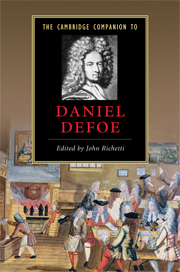Book contents
- Frontmatter
- Introduction
- 1 Defoe: the man in the works
- 2 Defoe’s political and religious journalism
- 3 Defoe, commerce, and empire
- 4 Defoe and criminal fiction
- 5 Money and character in Defoe’s fiction
- 6 Defoe’s Tour and the identity of Britain
- 7 Defoe as narrative innovator
- 8 Gender and fiction in Moll Flanders and Roxana
- 9 Defoe and London
- 10 Robinson Crusoe: varieties of fictional experience
- 11 Defoe: satirist and moralist
- 12 Defoe and poetic tradition
- Further Reading
- Index
2 - Defoe’s political and religious journalism
Published online by Cambridge University Press: 28 March 2009
- Frontmatter
- Introduction
- 1 Defoe: the man in the works
- 2 Defoe’s political and religious journalism
- 3 Defoe, commerce, and empire
- 4 Defoe and criminal fiction
- 5 Money and character in Defoe’s fiction
- 6 Defoe’s Tour and the identity of Britain
- 7 Defoe as narrative innovator
- 8 Gender and fiction in Moll Flanders and Roxana
- 9 Defoe and London
- 10 Robinson Crusoe: varieties of fictional experience
- 11 Defoe: satirist and moralist
- 12 Defoe and poetic tradition
- Further Reading
- Index
Summary
In his book on The Invention of the Newspaper, Joad Raymond remarks that in the early part of the seventeenth century it was customary to greet people with the expression “What News?” He argues that such a greeting is suggestive of a society that was eager to be informed about the events of the time and maintains that this was a development that led to the numerous newsletters that circulated during the period between 1642 and 1660 known as the Interregnum. Indeed, although Ben Jonson's satirical comedy The Staple of News (1626) mocked the notion of an office that distributed news and showed it going belly up, like so many projects of the time, he clearly saw the need for news and the willingness to pay for it as a developing element in society. This scepticism about the value of news was later reflected in Spectator essay no. 452, by Addison and Pope. On 8 August 1712, they wondered about “half a Dozen Ingenious Men, who live very plentifully upon this Curiosity of their Fellow-Subjects,” especially since, with the end of the War of the Spanish Succession, there appeared to be a dearth of news. They then provided a list of trivial stories - happenings of no significance - that might fill up the newspapers. In fact, as newspapers grew in size, there was a need for such filler. But for all such criticism, as Raymond argues, an active press might succeed in creating a coherent nation in England. When large parts of the population shared knowledge of what was happening within England and abroad, there was a possibility of communication among those in the country and those in the towns. Such a system of news had been fully achieved by the early eighteenth century, when writers such as Daniel Defoe and Jonathan Swift were to struggle for command of the kind of public opinion that might influence elections or votes in Parliament.
- Type
- Chapter
- Information
- The Cambridge Companion to Daniel Defoe , pp. 25 - 44Publisher: Cambridge University PressPrint publication year: 2009
- 2
- Cited by

